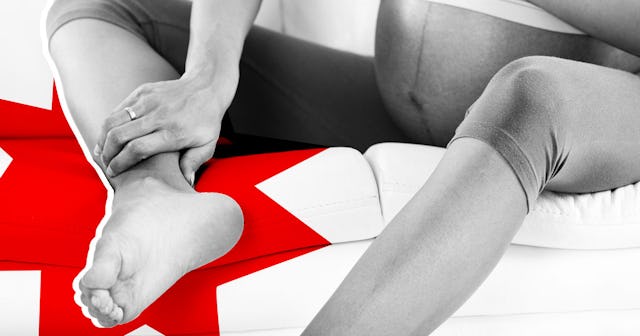Swelling Is Normal During Pregnancy, But It Could Be A Sign Of Preeclampsia

Toward the end of each of my pregnancies, my hands got so swollen that I had to remove all my rings, including my wedding ring. My feet and ankles weren’t looking so lovely either (“cankles” are definitely a thing, let me tell you). Yeah, I pretty much felt like one giant bloated blob, especially when I was pregnant with my second son in the middle of summer. Pregnancy is so fun, huh?
Like most women, I had a normal case of pregnancy edema, which is where your feet, ankles, and hands swell up a bit. It usually happens at the end of pregnancy and has to do with the fact that your body is basically a festival of fluids at that point. Blood and fluid levels double in pregnancy and some of it ends up in your extremities.
Sometimes the swelling can be kind of bonkers. I wasn’t one of the lucky gals whose feet swelled up so badly that wearing normal shoes was no longer an option, but this is definitely a common scenario and within the realm of normal. Some woman get such bad swelling in their hands that they get symptoms of carpal tunnel syndrome – another normal, but stupidly annoying occurrence.
So the question becomes: When is fluid build-up and swelling not normal, and what should you do if you’re concerned about it?
fotostorm/Getty
According to Cara Terreri, childbirth educator and doula, swelling, edema, and those beloved cankles are “very common and normal.” Terreri emphasizes that edema is normal when it happens at the end of pregnancy (third trimester), after you’ve been standing for long periods of time, and can get especially exacerbated in summer.
Interestingly, says Terreri, all that excess fluid has a real purpose, too.
“During pregnancy, your body produces 50% more blood and bodily fluids, most of which is created to meet baby’s needs,” Terreri explains on the Lamaze website. “These excess fluids also pool in your bodily tissues and joints, which is necessary to allow your body to soften in order to expand throughout pregnancy as well as prepare for birth.”
I guess nature has a plan, which is definitely cool. (But not so cool when your feet are so swollen that flip-flops are your only footwear option, even in the dead of winter.)
Swelling becomes a problem when it is excessive, or when you also notice swelling on your face or see puffiness around your eyes. But perhaps the biggest problems occur when your swelling is accompanied by other concerning symptoms – because swelling accompanied by symptoms such as headache or high blood pressure may be in indicator that you are suffering from pre-eclampsia.
Preeclampsia is a very scary pregnancy condition that we should all be aware of. According to the American College Obstetricians And Gynecologists (ACOG) preeclampsia “is a serious blood pressure disorder that can affect all of the organs in a woman’s body.” Its main symptoms include extreme swelling (especially of the face and hands), severe headaches, “seeing spots” or blurry vision, abdomen or shoulder pain, nausea, vomiting, sudden weight gain, labored breathing, and protein in the urine.
If untreated, preeclampsia can cause your organs to shut down and may cause maternal or infant death. Totally terrifying, right?
The good news is that if caught early enough, preeclampsia is treatable, and most women with it go on to have healthy babies. Your healthcare provider will be looking for signs of preeclampsia during your prenatal visits – and it’s one of the reasons there are so many more frequent visits at the end of pregnancy.
It’s so important not to miss your prenatal appointments. But remember that you can always, always call your healthcare provider between appointments if you have any concerning symptoms that accompany your swelling and edema. Answering all of your many questions or concerns is their job, and they’ve heard it all, so don’t be afraid to call.
Thankfully, for the majority of us, looking and feeling a bit like a beached whale is just par for the course in a normal pregnancy. Terreri says things like elevating your legs, resting regularly, and staying out of the heat can help. (I pretty much spent the last month of my summer pregnancy parked in front of the A/C.)
Drinking plenty of water can help too. It might sound counterintuitive when extra fluid is the damn problem here, but drinking water helps flush out some of that excess fluid. Go figure, right?
In most cases, though, there is really only one solution to getting rid of your ridiculous swelling: Giving birth. Yep, according to Today’s Parent, most of your swelling should subside within about 24 hours of giving birth.
Until then, it’s kind of a “grin and bear” it type of scenario. But I say you can also use it as a time to get some extra TLC. So put your feet up, sip some cool drinks, and make your loved ones pamper the heck out of you. You deserve it.
This article was originally published on